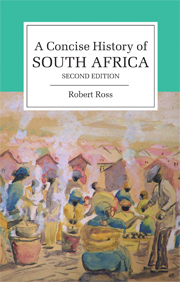Book contents
- Frontmatter
- Dedication
- Contents
- List of illustrations
- Preface
- Terminology and orthography
- Introduction
- 1 The settlement of the country
- 2 Colonial conquest
- 3 Unification
- 4 Consolidation
- 5 Apartheid
- 6 The costs of apartheid
- 7 ‘Let freedom reign’: the ending of apartheid and the transition to democracy, 1980–1994
- 8 Epilogue: the acid rain of freedom
- Suggestions for further reading
- Index
2 - Colonial conquest
Published online by Cambridge University Press: 18 December 2014
- Frontmatter
- Dedication
- Contents
- List of illustrations
- Preface
- Terminology and orthography
- Introduction
- 1 The settlement of the country
- 2 Colonial conquest
- 3 Unification
- 4 Consolidation
- 5 Apartheid
- 6 The costs of apartheid
- 7 ‘Let freedom reign’: the ending of apartheid and the transition to democracy, 1980–1994
- 8 Epilogue: the acid rain of freedom
- Suggestions for further reading
- Index
Summary
After 1500, South Africa ceased to be a place at the end of the world. Once Europeans had discovered how to sail from their home countries to the southern coasts of Asia around the Cape of Good Hope, the region came to be exposed to a whole new set of influences and, eventually, to European conquest and settlement.
It did not happen immediately. The killing of the Portuguese admiral Francisco de Almeida on the shores of Table Bay encouraged his successors to concentrate their African efforts on the east coast of the continent, well to the north of modern South Africa, where they could acquire gold, slaves and ivory not yet available to the south. When, after 1600, the Vereenigde Oost-Indisch Compagnie (the Dutch East India Company, usually known as the VOC) began to challenge the Iberians for supremacy among Europeans in Asia, its mariners discovered the advantages of sailing due east from the Cape on the reliable westerly winds before swinging north to India or Java. They could return on the south-east trade winds directly from there to Natal. As a result, their only landfall, in both directions, was in modern South Africa. The advantages for Dutch shipping of a permanent establishment on the coast of the country soon became evident.
In 1652 a small party of Dutchmen under Jan van Riebeeck arrived in Table Bay. In political and constitutional terms, the modern South African state is the lineal descendant of Van Riebeeck's settlement.
Initially, the Dutch intended their establishment to be no more than a trading post. They hoped to acquire the supplies they needed for ships which put into Table Bay – food, firewood and water – from the Khoikhoi of the area in exchange for European commodities, or as free goods. However, within a decade or so it became clear that, even under duress, the Khoikhoi were unable or unwilling to supply meat demanded by several thousand sailors who still had a voyage of about four months to make.
- Type
- Chapter
- Information
- A Concise History of South Africa , pp. 22 - 58Publisher: Cambridge University PressPrint publication year: 2008



